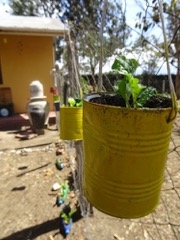Kitchen gardens and innovative kids - growing together at Plaster House
Published
2016-12-06
This ECHOcommunity Update provided by ECHO East Africa intern Travis Silveus
Plaster House is a not-for-profit organization based in Arusha, Tanzania. Their aim is to provide a safe place for healing after surgery for children of all ages. At any one time you can find around one hundred kids boarding at the house waiting to go into surgery or recovering from operations. It’s common to find children with severe burns, club feet, cleft palates or missing limbs playing together in the yard. Safe spaces can be hard to find when so often village-life is based on living within the standard of normalcy, which too often includes appearances. Plaster House gives off a fragrance of acceptance and visitors can see a smiling community in the midst of such trying circumstances. Many times students can spend an indeterminate amount of time at the Plaster House depending on the severity of the surgery needed. Volunteers come and visit but oftentimes the older boys can be overlooked as they don’t quite fit into programs that are directed to young children. As a result, Plaster House nurse, Hannah , invited ECHO to come and design some educational opportunities for the youth. The goal was to construct some kitchen gardens and provide a mentorship between the boys and male role models.
Over the last several months, Venance Mollel, Adiveckson Mamkwe, and Travis Silveus and others (Elly Embowe, Hannah Hacker) have visited weekly. On the first visit, Venance explained that the purpose of ECHO was to encourage creativity with farmers to solve problems that they’re facing. Before we left, we asked the boys to be creative to make something new out of used water bottles. The following week, we were happy to find that the youth had made a number of things out of the bottles including several garden designs and a simple drip irrigation system. We took some photos and celebrated their creativity. The consecutive weeks we discussed sack gardens, tire gardens, medicinal uses of native plants and nutrition. The ECHO staff planted chaya and leaf cassava cuttings and explained the uses of the perennial greens and encouraged cooking staff to incorporate them into the diets. Along with the sweet potato greens from the sack garden, the amaranth and celery in the tire garden and the garlic to be planted in the keyhole garden, ECHO has worked to supplement the diets of the lodging students. ECHO was very pleased to host a group of youth from Plaster House. Most of the time, a trip off of the campus means going into surgery- so the teens were much relieved for a chance to explore and learn outside of the walls. The ECHO staff received the teens and we are looking forward to continue mentoring Victor, the gardener, as the on-site teacher to continue educating new groups of boys and girls hosted at Plaster House.